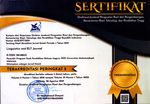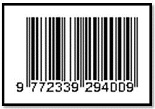University Students’ Perception About Plickers for Online Formative Assessment Tools
Abstract
Current digital era has influenced the education system to provide technology-oriented activity in the classroom. The development of online formative assessment tools is one of the impacts of this digital revolution. This study aims at providing the perception of the university students on the use of one of online assessment tools called Plickers. The participants of this study consist of 11 pharmacy faculty students who got an English training. The use of Plickers was on their formative assessment of the English training. A semi-structured interview was conducted in order to gain the data. The interview focused on two research questions:(1) How do the university students compare traditional method with Plickers for English formative assessment? and (2) How are their perceptions on Plickers for English formative assessment? The results showed that the students had positive perceptions toward Plickers. When comparing Plickers to the traditional assessment method, the participants found that Plickers was more modern, more fun, and more effective and efficient. This study also elaborates the strength and the weakness of the Plickers in terms of the specific application. These findings could provide more insight on the use of Plickers for the assessment especially in Indonesian education.
Keywords
Full Text:
PDFReferences
M. Sharma, “Teacher in a Digital Era,” Glob. J. Comput. Sci. Technol., vol. 17, no. 3, pp. 11–14, 2017.
N. Dabas, “Role of Computer and Information Technology in Education System,” Int. J. Eng. Tech., vol. 4, no. 1, pp. 570–574, 2018.
S. Ghavifekr and W. A. W. Rosdy, “Teaching and Learning with Technology: Effectiveness of ICT Integration in Schools,” Int. J. Res. Educ. Sci., vol. 1, no. 2, p. 175, 2015, doi: 10.21890/ijres.23596.
I. Elmahdi, A. Al-Hattami, and H. Fawzi, “Using Technology for Formative Assessment to Improve Students’ Learning.,” Turkish Online J. Educ. Technol. - TOJET, vol. 17, no. 2, pp. 182–188, 2018.
R. Jinu and S. S. Beegum, “Plickers: A tool for language assessment in the digital age,” Int. J. Recent Technol. Eng., vol. 8, no. 2 Special Issue 3, pp. 166–171, 2019, doi: 10.35940/ijrte.B1031.0782S319.
I. Wilujeng and H. Kusnowanto, “Physical Learning Using Model Direct Instruction Assisted Application Plickers to Measure the Understanding of the Concept of Students,” SAR J., vol. 2, no. 2, pp. 55–60, 2019, doi: 10.18421/SAR22-02.
A. Gurisik, “Opinions Of High School Students About Plickers : One Of The Online Formative Assessment Tools,” Int. J. Sci. Res. Innov. Technol., vol. 6, no. 1, pp. 11–25, 2019.
D. Kent, “Technique efficacy when using a student response system in the reading classroom,” Lang. Learn. Technol., vol. 23, no. 1, pp. 26–35, 2019, doi: 10.125/44668.
D. Kent, “Plickers and the pedagogical practicality of fast formative assessment,” Teach. English with Technol., vol. 19, no. 3, pp. 90–104, 2019.
D. Kent, “Viability of employing the plickers SRS in the Korean TEFL university setting,” J. Asia TEFL, vol. 16, no. 1, pp. 385–392, 2019, doi: 10.18823/asiatefl.2019.16.1.28.385.
E. A. Michael, I. E. A. Ejeng, M. A. Udit, and M. M. Yunus, “The Use of Plickers for Language Assessment of Reading Comprehension,” Int. J. Acad. Res. Bus. Soc. Sci., vol. 9, no. 1, pp. 637–645, 2019, doi: 10.6007/ijarbss/v9-i1/5464.
D. Brown, Language Assessment: Principles and Classroom Practices. New York: Longman, 2004.
R. B. Kuriakose and N. Luwes, “Student Perceptions to the Use of Paperless Technology in Assessments–A Case Study Using Clickers,” Procedia - Soc. Behav. Sci., vol. 228, no. June, pp. 78–85, 2016, doi: 10.1016/j.sbspro.2016.07.012.
L. Chng and R. Gurvitch, “Using Plickers as an assessment tool in health and physical education settings,” J. Phys. Educ. Recreat. Danc., vol. 89, no. 2, pp. 19–25, 2018, doi: https://doi.org/10.1080/07303084.2017.1404510.
S. Wuttiprom, K. Toeddhanya, A. Buachoom, and K. Wuttisela, “Using Plickers Cooperate with Peer Instruction to Promote Students’ Discussion in Introductory Physics Course,” Univers. J. Educ. Res., vol. 5, no. 11, pp. 1955–1961, 2017, doi: 10.13189/ujer.2017.051111.
E. Solmaz and E. Çetin, “Ask-Response-Play-Learn: Students’views On Gamification Based Interactive Response Systems,” J. Educ. Instr. Stud. World, vol. 7, no. 3, pp. 13–19, 2017, doi: 10.1016/j.jenvman.2018.01.013.
C. Ozan and R. Y. Kincal, “The Effects of Formative Assessment on Academic Achievement , Attitudes toward the Lesson , and Self-regulation Skills,” Educ. Sci. THEORY Pract. Educ., no. March 2016, pp. 85–118, 2018, doi: 10.12738/estp.2018.1.0216.
DOI: https://doi.org/10.31764/leltj.v11i2.20293
Refbacks
- There are currently no refbacks.
Copyright (c) 2023 Erlin Pebriantika

This work is licensed under a Creative Commons Attribution-ShareAlike 4.0 International License.
_____________________________________________________
Linguistics and ELT Journal
p-ISSN 2339-2940 | e-ISSN 2614-8633

LELTJ is licensed under a Creative Commons Attribution-ShareAlike 4.0 International License.
_____________________________________________________
LELTJ is abstracting & indexing in the following databases:
_____________________________________________________
LELTJ Editorial Office:













